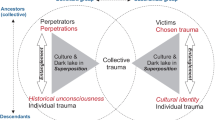
Overview
- Formulates a theory of collective trauma and a theory of recognition
- Discusses how collectives mourn through protest
- Builds on the trauma theory of psychoanalyst Sándor Ferenczi and his idea of the ‘confusion of tongues’
Part of the book series: Studies in the Psychosocial (STIP)
Access this book
Tax calculation will be finalised at checkout
Other ways to access
About this book
Similar content being viewed by others
Keywords
Table of contents (11 chapters)
-
Front Matter
-
Trauma and Denial
-
Front Matter
-
-
Trauma and Recognition
-
Front Matter
-
-
Back Matter
Reviews
“This book is an important contribution, and much needed, in these frightening times of widespread and increasing state violence. Soreanu’s ideas could be put to good use by potentially sympathetic commentators with big megaphones and broad influence, and by groups resisting oppression in their own countries.” (Jay Frankel, The American Journal of Psychoanalysis, Vol. 79 (1), March, 2019)
“This work can also be a good introductory text … .It is one of those rare texts that is both profound psychosocial research and an accessible read for the general public.” (Endre Koritar, International Forum of Psychoanalysis, May 07, 2019)
“This is a highly unusual and compelling account of Sándor Ferenczi’s metapsychology, and its potential for understanding how a crowd is able to think, act and direct itself in an act of healing, even under the threat of extreme violence. Raluca Soreanu offers us an analysis of the Brazilian uprisings of 2013 that completely transforms our assumptions about the meaning of collective protest and its relation to collective trauma. Street protest as a political formation emerges … as creative in highly precise ways, and … she produces a unique way of understanding what can preserve life in situations in which extreme violence rips through the social body. … Soreanu shows how a ‘wounded’ crowd can mourn in an organized way, even when there is no central organizing body that directs the protest from within. Offering us a new psychosocial theory of collective trauma, mourning and recovery, it is nothing short of brilliant.” (Lisa Baraitser, Birkbeck, University of London, UK)
“In times that call for resistance to resurgent political authoritarianism, finding ways to establish democratic spaces for association and solidarity are of the utmost importance. Drawing on the psychoanalytic ideas of Sándor Ferenczi, now re-emerging as a powerful theorist of trauma, and locating her thinking in relation to the actualities of the 2013 Brazilian street protests, Raluca Soreanu explores issues of violence, memory, mourning and recognition in their personal and social configurations. This book is poetic and scholarly, innovatively combining psychoanalytic and social ‘voices’ to offer new routes through to collective action.” (Stephen Frosh, Birkbeck, University of London)
Authors and Affiliations
About the author
Bibliographic Information
Book Title: Working-through Collective Wounds
Book Subtitle: Trauma, Denial, Recognition in the Brazilian Uprising
Authors: Raluca Soreanu
Series Title: Studies in the Psychosocial
DOI: https://doi.org/10.1057/978-1-137-58523-3
Publisher: Palgrave Macmillan London
eBook Packages: Behavioral Science and Psychology, Behavioral Science and Psychology (R0)
Copyright Information: The Editor(s) (if applicable) and The Author(s) 2018
Hardcover ISBN: 978-1-137-58522-6Published: 05 April 2018
Softcover ISBN: 978-1-349-84412-8Published: 07 September 2020
eBook ISBN: 978-1-137-58523-3Published: 22 March 2018
Series ISSN: 2662-2629
Series E-ISSN: 2662-2637
Edition Number: 1
Number of Pages: XII, 247
Topics: Personality and Social Psychology, Psychotherapy and Counseling, Psychosocial Studies, Community and Environmental Psychology, Social Theory



